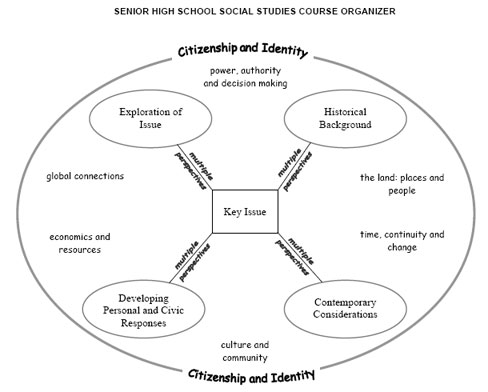| Social Studies | Close this window |
Senior High Overview

The course organizer acts as the conceptual framework for all of the high school social studies programs. At the centre of the organizer is one key issue, which is the focus for each course. Through the examination of multiple perspectives on the issues, students explore four related issues.
Although there is no mandated sequence in taking up the four related issues (RI), each course begins with a related issue dedicated to the exploration of the issue(RI 1), continues with an issue that examines the historical background of the issue(RI 2), incorporates an issue that focuses on contemporary considerations(RI 3), and finishes with an issue that asks students to develop personal and civic responses (RI 4).
The core concepts of citizenship and identity situated on the outer ring of the organizer form the basis for skills and processes outcomes in the program of studies.
Figure 1 - Social Studies Conceptual Framework

Figure 2 - Program of Studies Strands

In the program of studies, each grade is organized around a key issue and a key outcome that is common to both 10-1 and 10-2 sequences. For example, the Grade 10 course is organized around the key issue "To what extent should we embrace globalization?" This issue is reflected in the title of Social Studies 10-1, Perspectives on Globalization, and in the title of Social Studies 10-2, Living in a Globalizing World. The key outcome for both courses is the same: "Students will understand, assess and respond to the complexities of globalization."

